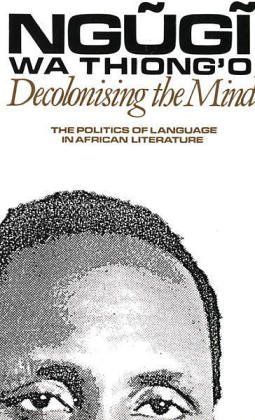Decolonising the Mind pdf free
Par murillo charles le dimanche, juillet 3 2016, 00:42 - Lien permanent
Decolonising the Mind. Wa Thiong'o Ngugi

Decolonising.the.Mind.pdf
ISBN: 0435080164,9780435080167 | 114 pages | 3 Mb

Decolonising the Mind Wa Thiong'o Ngugi
Publisher:
Decolonizing the Mind: The Politics of Language in African Literature. Decolonizing the mind is the third alternative. He wants other writers to follow his exa. Karmabinah · April 28, 2013 @ 10:15 am. Ngugi wa Thiong'o successfully wrote in English but eventually turned to writing in Gikuyu, his mother tongue. Director, The Barnard-Boecker Centre Foundation | 23 September 2012 · 15:35. Enole Ditsheko steps into the ongoing, and sometimes treacherous, conversation about the choice of African authors to write in English or in indigenous languages, such as Setswana or Gujarati. Ngugi's “Decolonizing The Mind” is an essay on language and how it communicates the culture of it's users. Webb se Alexander vriendelik, respekvol maar steeds vreesloos. He felt angry at the imperial or colonial languages being used in the discourse of African languages and chided Gabriel Okara for writing in English (in 'The Language of African Literature' and Decolonising the Mind). To control a people's culture is to control their tools of self-definition in relationship to others” – Ngugi, Decolonising the Mind: The Politics of Language in African Literature. �Decolonising the mind” was sterk dryfrede vir Alexnder. This reminds me what someone in Nguigi Wa Thiongo's Decolonising the Mind said. I wish you Egypt so you can decolonise your minds” says the Palestinian Human Rights Campaigner Omar Barghouti, to a packed plenary in Shoreditch Town Hall. James Currey, UK & Hieinemann Kenya. � Maggie Marx (@BookishMaggie) March 7, 2013. Ngugi Wa Thiongo's “Decolonising the Mind” holds true in the present day as well where we have failed to carve out our own subjectivity that would be perfectly divested of the Western thought of conduct and behaviour. Question: issues of concern in decolonising the mind - Question #371972. Ngugi begins his essay by telling the reader about his life growing up in Kenya. Scholar Ngũgĩ wa Thiong'o famously rejected English, the colonial language of Kenya, as a medium for his creative writing, and later fully committed to writing solely in his native Gikuyu after writing Decolonizing the Mind.